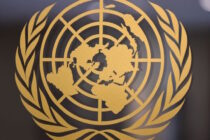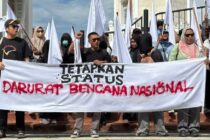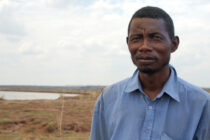In 2024, for the first time, the global average temperature exceeded 1.5°C above pre-industrial levels, making rapid coordinated global climate action even more urgent. Weiterlesen
Global: US withdrawal from landmark Paris Climate Agreement threatens “a race to the bottom”
Responding to the withdrawal of the United States of America from the Paris Climate Agreement, Marta Schaaf, Amnesty International’s Programme Director for Climate, ESJ and Corporate Accountability, said: Weiterlesen
USA: International withdrawals are a vindictive effort to tear apart a global system for cooperation
Responding to the Trump administration’s announcement that the United States is withdrawing from 66 international organizations, conventions, and treaties, Erika Guevara Rosas, Amnesty International’s Senior Director of Research, Advocacy, Policy and Campaigns, said: Weiterlesen
Ellinor: “While I still have power to fight for Indigenous rights in Norway, I will”
Ellinor Guttorm Utsi, 60, is a Sami reindeer herder from Norway. The Sami people are an Indigenous People with distinct culture, languages, and traditions who inhabit the northernmost regions of Norway, Sweden, Finland, and Russia. Weiterlesen
White flag flown in Aceh, national and international aid must be allowed in
Responding to the phenomenon of people raising white flags in Aceh amidst the poor handling of aid for victims of the ecological disaster on Sumatra Island, Amnesty International Indonesia Executive Director Usman Hamid said: Weiterlesen
Stories of hope and humanity to end the year
Despite the stark challenges currently facing humanity, Amnesty International continues to witness how people from all over the world are demonstrating the importance of activism and the life-changing power of solidarity.
From holding governments to account and pursuing justice for survivors of gender-based violence, to freeing human rights defenders, here are some inspiring stories of hope and humanity from the past six months to take you into the new year. Weiterlesen
Damisoa: we left our drought-stricken land and found new struggles
Damisoa tells his story of displacement and survival and calls for the government to take urgent steps to address the hunger, homelessness and poor healthcare faced by him and others displaced by drought in Madagascar. Weiterlesen
True climate justice demands a reckoning with colonialism
By Nciko wa Nciko and Samrawit Getaneh Weiterlesen
Libre: “I’ve been held in custody and prosecuted for blocking traffic”
In this story, Libre reveals what inspired her activism, and why she’s hoping her engagement will lead to changes. Weiterlesen
COP30: Rights trampled, yet people power demonstrates that humanity will win
Leaders at COP30 in Brazil failed to agree to place people over profits as a lack of unity, accountability and transparency chipped away at delivering the urgent and effective climate action needed, though there were some bright spots, Amnesty International said today at the end of the annual UN climate summit. Weiterlesen










